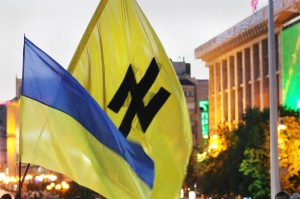 The story of the Ukraine crisis can be told in many ways, but the gas supply is perhaps the most important starting point. Half of the gas that transits from Russia to the European Union flows through multiple pipelines striping Ukraine. The over-dependence of the country on this fuel is above all a convenience, from it obtaining a large share of its heating and electricity.
The story of the Ukraine crisis can be told in many ways, but the gas supply is perhaps the most important starting point. Half of the gas that transits from Russia to the European Union flows through multiple pipelines striping Ukraine. The over-dependence of the country on this fuel is above all a convenience, from it obtaining a large share of its heating and electricity.
The government of Viktor Yanukovich, facing a gripping economic crisis, managed to get from Russia a reduction of the gas price to about half of that paid by costumers in the European Union. But this timely aid had a price: the definitive absorption of Ukraine into the sphere of influence of Russia and the BRICS. Reacting to this re-approximation towards Russia, various nationalist groups united against the government, paralysing the capital, boycotting negotiations with opposition parties and finally taking power in February.
During the weeks that followed Ukraine was ransacked. Offices of several companies and institutions were plundered and the head quarters of security forces occupied. Naftogaz, the company that distributes and manages gas storage in Ukraine, was one of the targets. Foreign currency reserves started to vanish - in part to support the Hryvnia, sinking under the power vacuum. The country's gold reserves - some 40 tons, equivalent to 1.3 thousand million euros - left the country in a furtive flight to unclear destination.
What followed is well known: massacre of civilians, a country broken in three, a separatist war, one million refugees.
With Yanukovych on the run, the Russians started demanding market prices for the gas consumed by Ukraine. The nationalists stopped paying immediately, and after successive ultimatums, supply was cut by the end of June. Since then Ukraine has been burning gas sent by Poland and Slovakia, apparently without requital. But this gas comes also from Russia and the Russians are not willing to increase flows to Ukraine's neighbours. With winter at the doorsteps, and an humanitarian disaster in sight, Kiev forwent the hard talk and sat at the negotiations table.
For this winter there is a pre-agreement with a price slightly below market prices. Thereafter, Russia and Ukraine will wait for a decision by an international arbitral court. Both parties also agreed on a figure for the gas left unpaid by the nationalists between February and June. To this figure adds a pre-payment for the months of November and December. It all sums up to almost three thousand million euros.
There is only a problem: the recently elected Ukrainian president asserts that his country does not have the money to pay such amount. Among the various options on the table, the most likely seems a payment directly from the budget of the European Commission. It is the money gathered from mine and your taxes dear reader.
Whatever happened to Ukraine's treasury?
Thank you for the article. That's a nice feature you have here - "listen now" by odiogo. But it seems I can't listen to the whole article - it plays only the beginning. Why so?
ReplyDeleteHi Stasia. I am aware of this issue for some time, unfortunately I have no way to solve it. Odiogo is an external service, that for some reason cuts the posts here at Blogger.
Delete